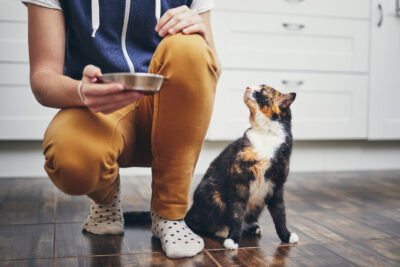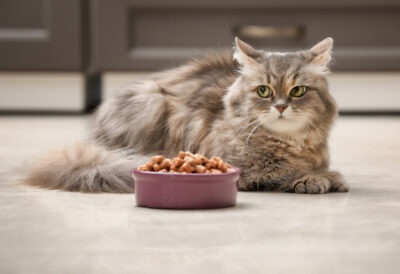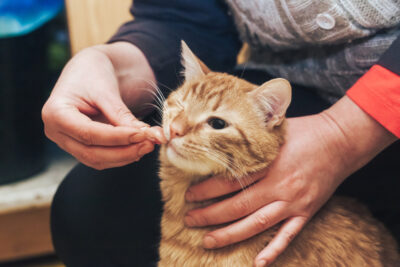What Is Hydrolyzed Protein Cat Food? Information and Product Picks

All featured products are chosen at the discretion of the GreatPetCare editorial team and do not reflect a direct endorsement by the author or reviewer.
Hydrolyzed protein diets can offer significant benefits for cats and dogs with dietary sensitivities. In these pets, the immune system reacts to proteins that are found in the diet, such as beef or chicken, seeing them as a foreign substance that must be attacked. A hydrolyzed protein diet prevents this immune response by only including proteins that are broken down to a size that is too small to be recognized by the immune system.
Whether your veterinarian has recommended switching to hydrolyzed protein cat food or you’re researching dietary options for a cat with a medical condition, we’ve rounded up everything you need to know about this type of diet.
What Is Hydrolyzed Protein Cat Food?

Hydrolyzed protein food for cats is a prescription diet that is prescribed for cats with specific medical conditions. Hydrolyzed protein food is not beneficial for every cat; instead, it is available only on the recommendation of a veterinarian.
In a hydrolyzed protein cat food, the proteins have undergone a process known as hydrolysis. This process uses water to break proteins down into their smallest building blocks. Instead of containing normal beef, chicken, or fish proteins, hydrolyzed protein cat food contains protein fragments that cannot be recognized by the immune system. These protein fragments serve as a valuable source of nutrition, but they are too small to trigger an allergic response in cats who eat these diets.
Why Vets Might Recommend Cat Food with Hydrolyzed Protein
Veterinarians typically recommend hydrolyzed protein diets for cats who have had a confirmed or suspected immune response (allergic response) to their diet. This typically includes two categories of cats: cats with food allergies and cats with inflammatory bowel disease.
Hydrolyzed protein diets are often used to manage food allergies. In cats, food allergies are one cause of allergic skin disease, which may result in red, itchy skin and recurrent ear infections. These cats experience an immune reaction to proteins in their diet, and this reaction causes skin and ear inflammation. Feeding these cats a hydrolyzed protein diet (with no other food or treats) prevents that immune reaction. This typically alleviates the signs of food allergy, without a need for other medications or treatments.
Inflammatory bowel disease (IBD) is also often treated with hydrolyzed protein diets. Cats with IBD may experience a number of gastrointestinal signs, including vomiting, diarrhea, and weight loss. Many cats with IBD develop intestinal inflammation as an immune response to proteins in their diet. Feeding a hydrolyzed protein diet (without any other food or treats) can aid in the management of IBD by reducing intestinal inflammation.
Pros and Cons of Hydrolyzed Protein Cat Food

Hydrolyzed protein cat food can offer significant benefits for cats with food sensitivities. However, there can also be disadvantages to feeding hydrolyzed protein cat food. Let’s look at both the pros and cons:
Pros
- Successfully manage common conditions like food allergic dermatitis and IBD
- Nutritionally complete and well-balanced
- Available in dry and canned formulations
- Manufactured by several trusted diet manufacturers
Cons
- Cost is often significantly higher than over-the-counter diets
- Limited number of flavor choices
- Limited number of texture choices
Switching to a Hydrolyzed Protein Cat Food

If your cat may have food allergies or IBD, talk to your veterinarian about the use of hydrolyzed protein cat food. Many of these diets are available only with a veterinarian’s prescription, so you will need your veterinarian’s approval to start your cat on a hydrolyzed protein diet.
In order for a hydrolyzed protein to offer benefits, you need to be sure that it is the only food your cat is eating. Cats with dietary sensitivities are often sensitive to very small quantities of ingested allergens. Feeding a hydrolyzed protein diet while continuing to offer table food and over-the-counter cat treats is unlikely to offer any benefits for your cat. Instead, consider avoiding typical cat treats and using hydrolyzed protein treats. Some pet parents choose to bake their own treats, using hydrolyzed protein wet cat food.
When switching to a hydrolyzed protein cat food, it is best to make this transition gradually. Transition your cat from their old food to a hydrolyzed protein cat food gradually, over a period of approximately one week, to reduce the risk of diarrhea and other gastrointestinal effects. Each day, feed your cat a little bit more of the hydrolyzed protein cat food and a little bit less of their original diet, feeding a 50/50 mix of both foods by mid-week and transitioning entirely to the hydrolyzed protein cat food by the end of the week.
In some cases, your veterinarian may advise making a more abrupt transition, to more rapidly alleviate your cat’s clinical signs. If this is the case, follow your veterinarian’s advice when transitioning to a hydrolyzed protein cat food.
Cats with food allergies or IBD will often remain on a hydrolyzed protein for the rest of their life. These diets offer a safe and balanced source of nutrition, and they are appropriate for long-term, lifelong feeding.
Hydrolyzed Protein Cat Food Brands to Consider
Hydrolyzed protein cat foods are available from a number of different pet food manufacturers. Veterinarians often recommend prescription diets made by Hill’s, Royal Canin, or Purina Pro Plan. These three brands are known for their nutritional quality and their extensive research on pet foods. Hydrolyzed protein diets available from these three pet food manufacturers include:
Hill’s Hydrolyzed Protein Cat Food


Royal Canin Hydrolyzed Protein Cat Food


Purina Hydrolyzed Protein Cat Food

If you are looking to purchase a hydrolyzed diet from an alternative brand, Blue Buffalo hydrolyzed protein cat food is also available:


Talk to your veterinarian if you are interested in feeding your cat a hydrolyzed protein diet. Your veterinarian can help you determine whether a hydrolyzed protein diet is necessary and can help you select the best diet for your cat.









